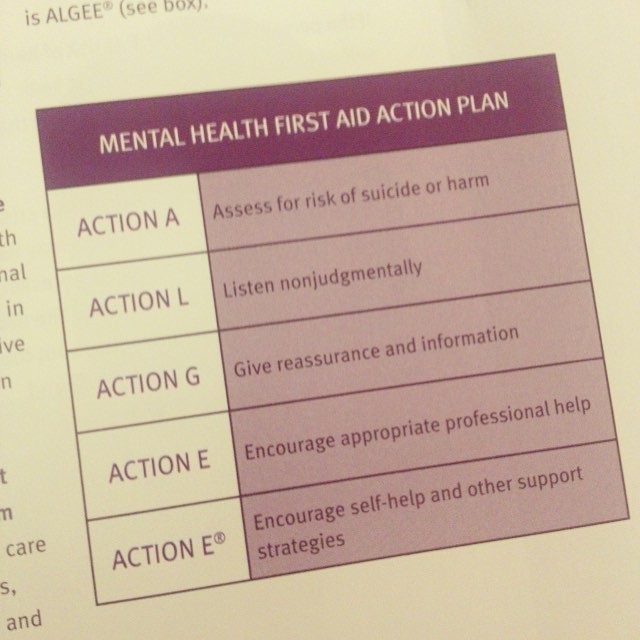Are You Thinking About Suicide? And Other Questions We’re Afraid To Ask

Talking about suicide can be hard. It makes my chest tight. But so many of us are suffering and we all want to do something, so let me ask you this:
Are you prepared to offer help to someone in emotional distress?
I think it’s safe to assume that many of us feel incompetent in this area. How often does that stop us from reaching out when someone needs us?
I’m totally incompetent when it comes to helping people with physical medical problems, but if I saw someone on the street having a heart attack I would still offer to help, even if I didn’t know what to do.
I bet a lot of you are the same.
Even if we couldn’t remember how to do CPR or how to dress a wound, most of us would still reach out to someone having a physical medical emergency. We might offer a reassuring word, get the first aid kit, or call 911.
But what about when our friends, family, coworkers, and even strangers are suffering from a mental health emergency or are in emotional distress?
A lot of us just keep our heads down. Not because we’re bad people, but because we don’t understand mental health issues. We don’t know what to do. We might worry that we’ll make things worse than they already are.

Luckily, there’s something we can do about this. We can get trained.
I earned my certificates in Suicide Prevention Gatekeeper Training through NAMI Maine and in Mental Health First Aid through the National Council for Behavioral Health (offered internationally).
Both day-long trainings are designed to help everyday people learn how to effectively respond to individuals who are in psychological distress. Which is a lot of people. Consider this:
- One in five Americans experience a mental disorder in any one year.
- More than half of all adults in America will experience a mental disorder in their lifetime.
It’s highly likely that we will encounter someone (ourselves included) in need of mental health help at some point. So why not ditch the shame, clear up the confusion, and shed the stigma that surrounds mental health?
Let’s get informed. We can learn the risk factors and warning signs for mental health and addiction concerns, strategies for how to help someone in both crisis and non-crisis situations, and where to turn for help.
This goes double for us in animal care and welfare work. Working in a helping profession requires intense emotional labor. All of us are impacted, in varying degrees, by the stress, trauma, and suffering we bear witness to every day. Sometimes it’s really serious:
1 in 6 veterinary professionals have considered suicide.
If you suspect someone may be at risk for suicide, it’s important to ask directly about suicidal thoughts.
DON’T avoid using the word “suicide.” You’re not planting the idea in their mind if you do.
DO ask the question without dread and without expressing a negative judgement.
DO be direct:
Are you having thoughts of suicide?
Are you thinking about killing yourself?
Letting people know that you care and want to help can make a real difference. Be sure to have information and resources available if they need assistance.
In the First Aid course, we learned a handy acronym to help guide us through the process of reaching out to anyone in distress (which includes panic attacks, addiction, depression, and self harm):

In order to move towards the last 3 steps, we need to get educated.
Here are some resources:
- Learn the signs, what you can do to help, and more myths about suicide.
- More on suicide prevention here.
- O Magazine shared a number of first person stories that will help you understand how we can move from a dark place into a state of crisis. Plus a wellness tool created by a survivor that might save more lives.
- National Suicide Prevention Lifeline: 1-800-273-TALK (8255).
- Watch the free VetGirl webinar: Suicide in Veterinary Medicine
- I highly recommend the Mental Health First Aid training for all of us, but especially for people in management and leadership roles. Your staff and the public you work with (who are also in distress some of the time) need you to know this kind of basic first aid for a variety of common mental health problems. If you would like to get trained in Mental Heath First Aid, please visit this page.
Do whatever you can to help, but please don’t blame yourself if your efforts don’t result in a positive outcome.
I know there are those of you out there who have done all of the above and still lost a friend or coworker to suicide. Or maybe there were no signs, so you didn’t even think you needed to reach out. Either way, please know that what happened is not your fault.
Suicide is a public health crisis.
It’s the 10th leading cause of death in the United States.
54 percent of the people who died from suicide didn’t have a previously known mental health issue, but were suffering from other issues, such as relationship, financial, physical health, or job problems.
The CDC report cites the need for several different approaches for prevention, beyond the focus on reaching out for mental health help, such as teaching coping and problem-solving skills early in life and reducing “access to lethal means.”
Research shows that the decision to attempt suicide is often made quickly, in an impulsive way. One way to prevent suicide is to limit access to lethal means. That would allow intense feelings to pass and provides more time to get help. Kudos to veterinarian Dr. Andy Roark for taking on this aspect of suicide prevention in 2019 with his “4 Eyes” campaign.
Suicide is both an serious issue in our animal care community and a public health epidemic in our country. That means we all need all the help we can get to become more informed and effective in our prevention efforts.
We need to commit to reaching out to each other more AND understand that this is a complex issue, so despite our good efforts we won’t always be able to save everyone we love.
But we’ll keep trying.
Finally, if you are thinking about suicide call: 1-800-273-TALK
Please make the call.
Thoughts of suicide are often associated with a treatable mental disorder. These thoughts are common (you’re far, far from being alone) and do not have to be acted on.
If you call the crisis hotline number above, you’ll speak with a trained counselor who can help connect you to local resources and professionals who want to help. It’s free, 24/7, and confidential. Please call.
There’s only one of you in this world and we want you to stick around.
Let's Stay Connected.
Sign up for ideas, updates, and your free copy of The ABCs of Self Care Workbook!
I heart boundaries and will never sell your email address. Unsubscribe at any time.

